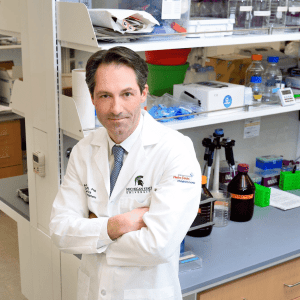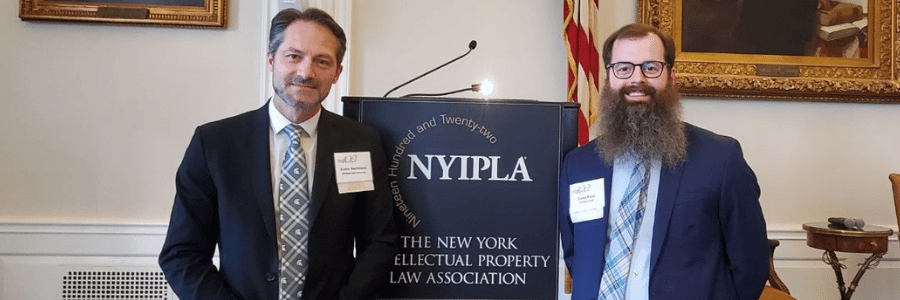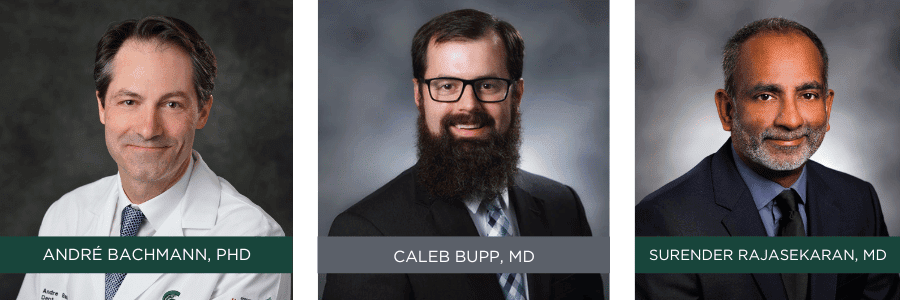College of Human Medicine professor André Bachmann and two Corewell Health physicians, Caleb Bupp and Surender Rajasekaran, have been named the 2023 Inventors of the Year for their discovery of a previously unknown disease and development of an effective treatment.
The award was presented by the New York Intellectual Property Law Association at its annual dinner on May 10.
 The award is in recognition of the work of Bachmann, PhD, Bupp, MD, and Rajasekaran, MD, to identify a previously unknown disorder, now known as Bachmann-Bupp syndrome, in a 3-year-old girl at Helen DeVos Children’s Hospital. Her symptoms included complete hair loss, an enlarged head, low muscle tone, and developmental delays. A genetic test ordered by Bupp revealed a mutation in a gene called ornithine decarboxylase 1 (ODC1). He later learned that Bachmann had spent almost three decades studying ODC1, which when mutated can trigger an over production of polyamines, natural compounds found in all lifeforms.
The award is in recognition of the work of Bachmann, PhD, Bupp, MD, and Rajasekaran, MD, to identify a previously unknown disorder, now known as Bachmann-Bupp syndrome, in a 3-year-old girl at Helen DeVos Children’s Hospital. Her symptoms included complete hair loss, an enlarged head, low muscle tone, and developmental delays. A genetic test ordered by Bupp revealed a mutation in a gene called ornithine decarboxylase 1 (ODC1). He later learned that Bachmann had spent almost three decades studying ODC1, which when mutated can trigger an over production of polyamines, natural compounds found in all lifeforms.
Bachmann’s research had focused on that gene’s role in a childhood cancer called neuroblastoma, which also involved over production of polyamines. He repurposed a drug called difluoromethylornithine, or DFMO, developed in 1978 as an anticancer drug and later used for treating West African sleeping sickness, to treat neuroblastoma.
With single-use compassionate authorization by the Food and Drug Administration, Bupp began treating his patient with DFMO. Nearly four years later, the patient, now 7 years old, “has made significant developmental progress,” has gained muscle tone, is able to feed herself, and has grown a full head of hair, Bupp said.
Since their initial discovery, a dozen other patients worldwide have been diagnosed with Bachmann-Bupp syndrome, and three have been successfully treated with DFMO in Grand Rapids.
The federal government granted MSU and Corewell Health a patent for DFMO, and Orbus Therapeutics has since licensed the patent.
In notifying Bachmann, Bupp, and Rajasekaran of their award, the New York Intellectual Property Law Association praised them “for your valuable contributions to medicine, life sciences and human health, and for your appreciation for and support of the US Patent system.”

Bachmann, a professor and associate chair for research in the college’s Department of Pediatrics and Human Development, said it is “a true honor to receive this prestigious national award…but most importantly, the treatment seems to work and help the children with Bachmann-Bupp syndrome.”
In a recent staff meeting, MSU Interim President Teresa Woodruff added her own praise. “Congratulations,” she said. “Carry the green and white proudly to New York City and know that we are behind you.”
This is not the first recognition that Bachmann, Bupp, and Rajasekaran have received for their discovery. The National Institutes of Health recently awarded them and a Johns Hopkins University School of Medicine researcher a $4 million grant to study the syndrome and other polyamine-related genetic disorders.
As a result of their discovery, Bachmann, Bupp, and Rajasekaran recently founded the International Center for Polyamine Disorders, a joint venture by MSU and Corewell Health.
This story first appeared on the MSU College of Human Medicine Website.
About the MSU Innovation Center:
The MSU Innovation Center is dedicated to fostering innovation, research commercialization, and entrepreneurial activities from the research and discovery happening across our campus every day. We act as the primary interface for researchers aiming to see their research applied to solving real-world problems and making the world a better place to live. We aim to empower faculty, researchers, and students within our community of scholars by providing them with the knowledge, skills, and opportunities to bring their discoveries to the forefront. Through strategic collaborations with the private sector, we aim to amplify the impact of faculty research and drive economic growth while positively impacting society. We foster mutually beneficial, long-term relationships with the private sector through corporate-sponsored research collaborations, technology licensing discussions, and support for faculty entrepreneurs to support the establishment of startup companies.
Is your company interested in working with members of MSU’s College of Human Medicine? Click Here.

